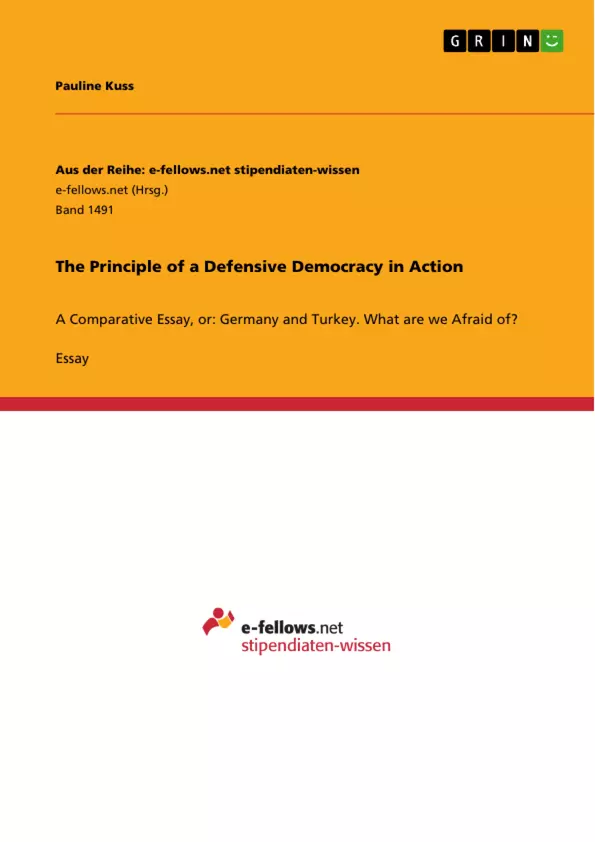Democracy is defined as “government by the people”. It grants equality and freedoms to all citizens and the fact that a stable democracy is one of the Copenhagen Criteria required by the EU from possible accession candidates shows the agreement and broad acceptance of democracy as the most just form of government we currently can think of.
Democracy stands out through the freedom and the possibility to actively engage in politics which it grants to all citizens. But this generosity comes with a price: Besides fostering the political dialogue it also gives space and opportunity to extreme and even anti-democratic powers which might misuse their rights granted by the system to actually abolish the same.
Do we have to accept this misuse as a side effect of democratic freedom or should we draw a line somewhere? Do we maybe even have a responsibility to protect our system?
The struggle between a solution to effectively protect the democratic system from misusing powers and the danger to actually undermine it ourselves by limiting the personal freedoms and rights which are at the core of it, is centralized in the ongoing debate about the idea of a “defensive democracy”. The question on how much freedom a democracy can bear and how much security it needs is no recent dispute and certainly a perpetual one. But with an eye on the current rise of right-wing parties in many European countries, the importance and pertinence of the discussion becomes clear.
In this paper I want to depict the concept of “defensive democracy” by comparing the examples of Germany and Turkey, both states with existing safety provisions in their constitutions. I will start with outlining the historical background of the current arrangements and a description of relevant cases of the past for each of them. I will furthermore compare the two approaches and finally end with a personal evaluation of the justification of bereaving individuals of their democratic freedoms in order to protect those rights for everyone else.
Table of Contents
- THE CONCEPT OF A "DEFENSIVE DEMOCRACY"
- LEARNING FROM The Past: "STREITBARE DEMOKRATIE" IN GERMANY
- THE ONGOING DEBATE AROUND THE NPD
- TURKEY: THE MILITARY AS THE GUARD OF THE CONSTITUTION
- THE REFAH PARTY: A CASE CHALLENGING EUROPEAN VALUES
- COMPARING The Defensive DEMOCRACIES OF GERMANY AND TURKEY
Objectives and Key Themes
This essay aims to explore the concept of a "defensive democracy" through the lens of Germany and Turkey, both of which have constitutional provisions aimed at protecting their democratic systems from anti-democratic forces. It examines the historical context and key cases that have shaped these provisions and compares the two approaches. The essay concludes with a personal assessment of the justifications for limiting individual freedoms to protect the rights of the collective.
- The principle of a "defensive democracy" and its implications for individual rights
- The historical context of the "defensive democracy" concept in Germany and Turkey
- The role of constitutional courts and military institutions in upholding democratic principles
- The debate surrounding the banning of political parties based on their ideology
- The balancing act between protecting democracy and preserving individual freedoms
Chapter Summaries
- THE CONCEPT OF A "DEFENSIVE DEMOCRACY": This chapter introduces the central question of the essay: whether it is justifiable to limit individual democratic rights in order to protect the system from anti-democratic forces. It highlights the tension between freedom of speech, assembly, and the need to safeguard democratic principles.
- LEARNING FROM The Past: "STREITBARE DEMOKRATIE" IN GERMANY: This chapter delves into the historical context of Germany's "defensive democracy," exploring the lessons learned from the failure of the Weimar Republic. It analyzes the constitutional flaws of the Weimar Constitution that contributed to the rise of Nazi Germany and outlines the safeguards implemented in the current German Constitution to prevent a similar scenario.
- THE ONGOING DEBATE AROUND THE NPD: This chapter examines the debate surrounding the potential banning of the Nationaldemokratische Partei Deutschlands (NPD), a right-wing party accused of promoting extremist ideologies. It discusses the legal framework for party bans in Germany and the challenges involved in balancing freedom of expression with the need to protect democracy.
- TURKEY: THE MILITARY AS THE GUARD OF THE CONSTITUTION: This chapter explores the role of the military in Turkish politics and the constitutional provisions designed to protect secularism and the democratic system. It highlights the historical context of military interventions and the emphasis on a strict separation of state and religion in the Turkish Constitution.
- THE REFAH PARTY: A CASE CHALLENGING EUROPEAN VALUES: This chapter examines the case of the Refah Party, an Islamist party banned in Turkey for its perceived threat to secularism and the democratic order. It explores the legal battle between the Refah Party and the Turkish government, including the role of the European Court of Human Rights.
Keywords
Key terms and concepts central to this essay include "defensive democracy," "constitutional provisions," "individual rights," "anti-democratic forces," "freedom of speech," "freedom of assembly," "party bans," "constitutional courts," "military interventions," "secularism," "religious ideology," and "European human rights standards."
- Arbeit zitieren
- Pauline Kuss (Autor:in), 2014, The Principle of a Defensive Democracy in Action, München, GRIN Verlag, https://www.grin.com/document/301251



